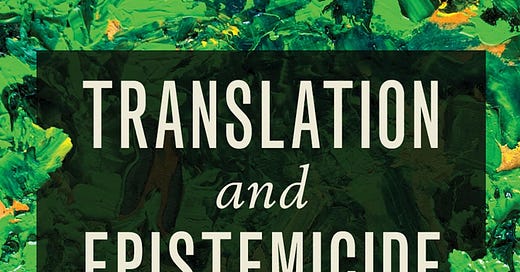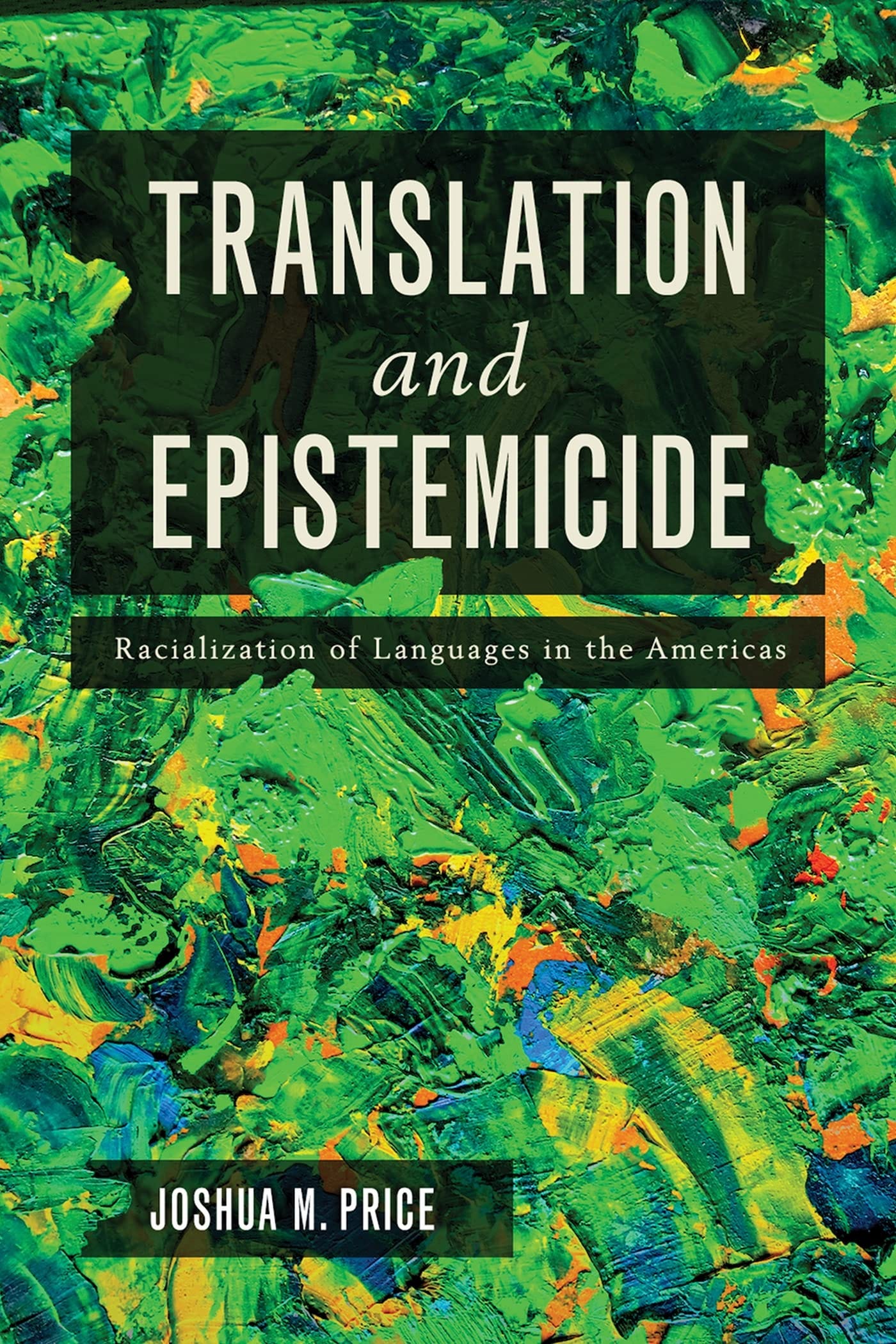Knowledge is power
Imperialism aims to erase indigenous wisdom. Review: Translation and Epistemicide: Racialization of Languages in the Americas, Joshua M Price, by Gavin O'Toole
Translation and Epistemicide: Racialization of Languages in the Americas, Joshua M Price, 2025, University of Arizona Press
Epistemicide is an invisible assassin—one of the most potent weapons of imperialism, yet also the most stealthy.
Coined in 1998 by the Portuguese Marxist Boaventura de Sousa Santos, this term defines the destruction, marginalisation or banishment of indigenous, subaltern and counterhegemonic knowledge.
We are witnessing it in action right now in Palestine, where Israel’s premeditated bombing of university buildings in Gaza—and the looting of artefacts—must be understood as an attempt to erase an entire intellectual tradition.
Tragically, there is nothing new in such destructive acts—imperial powers have consistently throughout history not only sought to oppress subject peoples, but to erase the knowledge accrued over millennia that makes them “peoples” in the first place.
Indeed, as author Joshua Price notes, epistemicide has been a means and a goal of modern imperial powers across the globe.
Nonetheless, Latin America during the Conquest and ever since has provided the archetypal examples of this, and hence the region has been a principal focus of study on this topic.
Epistemicide as a function of European imperialism began at the beginning, with the wanton vandalism of the sixteenth-century Franciscan missionaries, who burned nearly all of the Maya’s written records in an effort to eradicate their religion and history.
Yet there are, of course, many ways in which knowledge can be destroyed, and these are rarely as crude as simply throwing books on bonfires in order to impose foreign knowledge on conquered peoples.
As Price points out, imposing ideas is only one type of intellectual imperialism. He has turned his attention to an unacknowledged instrument of empire in a groundbreaking account of translation-as-epistemicide in the Americas from the colonial period to the war on terror.
He identifies four distinct operations through translation that lead to epistemicide: the commensuration of worlds; the epistemic marginalisation of subaltern translators and the knowledge they produce; the criminalisation of translators and interpreters; and translation as piracy or extractivism.
It was a process that began immediately: Price refers to the examples of early dictionaries of Quechua that omitted or distorted indigenous concepts perceived as antithetical to Catholicism, and the ways concepts such as “confession”, “God”, the “liturgy” etc. were translated by infusing existing Quechua words with new meanings or coining hybrid neologisms.
The author writes: “This was part of an effort to promote and purvey a Christian worldview and eschatology as truer than and spiritually superior to the subject epistemologies. Under the guise of a word-for-word symmetry between languages, the bilingual dictionaries imposed a hidden asymmetry.”
In short, they racialised languages and knowledge, then ensured these occupied subordinate positions in the hierarchy of power assumed by Eurocentric epistemology.
Indigenous translators themselves have been both complicit in and resistant to this assertion of hegemony, giving the translator as a subject an intrinsic ambivalence that it may in fact be impossible for them to escape.
Take the criollo intellectuals of the late colonial era who used translation in their ongoing struggles for national independence by, for example, translating and disseminating texts such as the French Déclaration des Droits de l’Homme et du Citoyen of 1789 and the US Declaration of Independence as part of emancipation and nation-building movements.
In so doing, they provided the seeds for a radical challenge to hegemonic “common sense” yet also imported Euro-American thinking which, as we know, retained forms of domination linked to bourgeois revolution itself, from maintaining slavery to gender hierarchy.
Price argues that translation as a struggle for control occurs in many realms of life—legal, literary, scientific and academic—and that we can map these practices on to colonial conflict and imperialism thence into contemporary forms of cultural domination.
He asks a radical question from the outset concerning the production of colonial-era bilingual dictionaries of Quechua, Aymara and Spanish as to how commensurate these “languages” were in terms of their epistemological and ontological statuses.
He writes: “Bilingual dictionaries presuppose commonality when no such commonality might obtain. The bilingual dictionary makes languages as such equivalent. As a technology of epistemicide, the bilingual dictionary failed to recognize Indigenous concepts of language … the incommensurable, the nonequivalent, was made commensurate and equivalent through translation.”
Price explores the decolonial approach to translation taken by the Peruvian writer José María Arguedas—particularly his theoretical efforts to reconcile the dualism of Quechua and Spanish—as an example of a thinker whose contribution has been minimised or ignored outside Peru.
In a fascinating chapter, the author examines cases in which translators have been criminalised in the US—for allegedly providing “material support” for terrorism, for example, most notably in a Middle Eastern context—and how this represents a contemporary form of epistemicide.
He writes: “Criminalizing translation as an activity is particularly insidious because it spreads fear and suspicion in racialized communities. It makes people hesitate before translating, or agreeing to translate, especially texts or discourses related to pressing domestic and overseas questions of war, labor, religion, terror, state terror, immigration, race, criminal justice, and so on.”
Price illustrates this with the case of Erik Camayd-Freixas, who had worked for 25 years as an interpreter for the federal court system and the US Department of Justice when the government called on him to interpret for undocumented Central Americans arrested by immigration officers.
The ethical dilemmas faced by Camayd-Freixas and his observations that due process was not followed in many of these cases led him to compile a report that became widely circulated and the basis of significant debate about the role and effectiveness of court interpreters.
Price writes: “What was highlighted was that the United States had an epistemicidal project and it wanted to harness translators to work in obedience to it (by making the defendants’ utterances neatly fit the legal protocols of criminalization and deportation instead of representing their actual stories).”
Finally, the author analyses how the appropriation of indigenous knowledge occurs in the social sciences and humanities, representing a form of piracy or extractivism by which academics from the US or Europe appropriate ideas from Latin America to package, copyright and market as their own.
He focuses on how creativity is assimilated in the context of performance studies, but how this can nonetheless sometimes be a two-way process by which culture from the US, Europe and other parts of the world are selectively appropriated in a way that fortifies Latin American creativity.
Translation has also clearly been used as a tool to contest colonisation, and to his credit Price concludes by examining tactics and strategies to confront epistemicide.
Decolonial translation, he notes with candour, faces the challenge of translating “into a political language and political geography that may not yet fully exist”.
It’s something of a leap of faith, perhaps requiring practices of communication, exchange and translation that adopt a conscious focus on multilingual, multilateral relationships.
Ultimately, the dilemma it poses, however, is that which every translator will be familiar with.
Price writes: “How can we translate for a future that calls to us, a future whose shape we cannot see, a delicate future that does not belong to us, and whose denizens speak languages we do not yet know how to speak?”
*Please help the Latin American Review of Books: subscribe for just one month ($5) and support our mission to offer readers more; or make a PayPal donation at editor@latamrob.com



